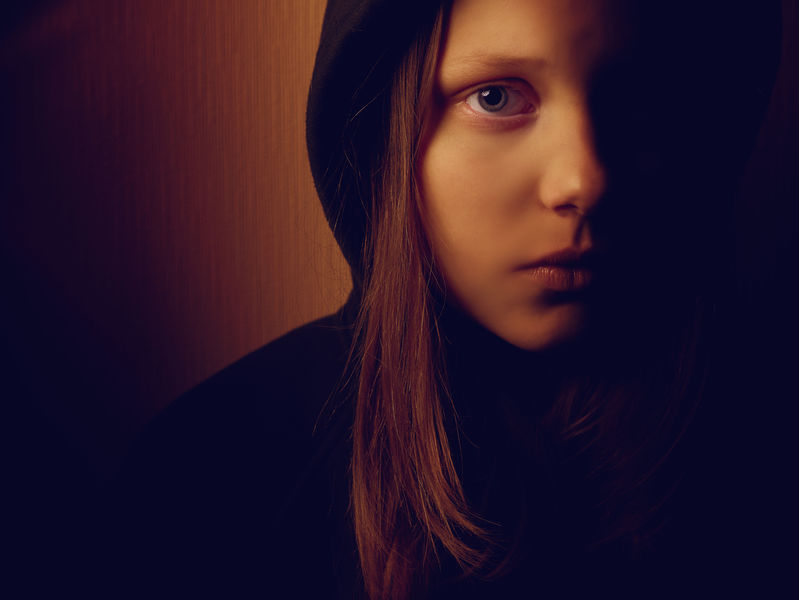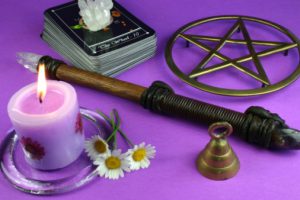 We have been receiving a lot of mail lately from concerned parents who have found unusual objects in their teens’ bedrooms and worry that their children might have been lured into one of the hottest trends among teens today – witchcraft. What signs should a parent look for in order to determine if their child is dabbling in the dark arts?
We have been receiving a lot of mail lately from concerned parents who have found unusual objects in their teens’ bedrooms and worry that their children might have been lured into one of the hottest trends among teens today – witchcraft. What signs should a parent look for in order to determine if their child is dabbling in the dark arts?
It’s no secret that witchcraft has become hugely popular among teens – particular among girls who are falling into the trap of believing that witchcraft is a new kind of female empowerment. For example, Veronica Varlow – aka the “Love Witch” (who is also an International burlesque showgirl) has a glamorous website full of ultra-feminine imagery in which she claims to guide women “to own their raw instinctual power through love, magic, sensuality, body confidence, sacred ceremony & tantra.” When you enter her website, you’re instantly greeted with a drop-box that lures in bold pink letters – “Join the Love-Witch Sisterhood! Get the secrets, divinations, and the discounts, Babe!”
Varlowe is just one of many “hipster witches” who are luring girls into the “Craft” by the thousands. All it takes is a combination of the typical teen girl’s low self-esteem and body image issues and a super-trendy female figure with all the answers and you have an instant connection. Insecure girl meets successful witch and voila! The magic happens.
And it’s easy to keep it happening, thanks to the “Influencer Witches of Instagram” with their tens of thousands of (mostly young female) followers and the Big Witch Energy (BWE) apparel that often distinguishes their fan club.
Once captured by the excitement of it all, it’s off to the online bookstore for a copy of the best-selling Teen Witch: Wicca for a New Generation by Silver Ravenwolf. Barnes and Noble, dedicates a whole section to books about spell-casting and wizardry.
For the typical parent who may be reading this blog, it probably sounds absolutely horrifying, and most will probably hope this dark trend never touches the life of their loved one, but too many parents have been contacting us lately whose daughters got caught up in this latest version of evil-chic. They sent me photos of the strange objects they found under their daughter’s bed or in a top drawer, and all of them look very much the same.
Here are some of the typical articles a parent may stumble across in a teen’s room that may indicate involvement in witchcraft.
Wrapped or corded bundles of roots and herbs
Candles
Essential Oils
Crystals & stones
Incense (such as Palo Santo sticks which often come with a crystal attached)
Spell books
Book of Shadows (which is the diary witches use to record their activities, favorite spells, etc.)
Tarot cards
Pentacles (particularly in jewelry)
Runes
 While some of these items may be innocent, if they are suddenly appearing in your teen’s room, it may be an indication that your child is dabbling in wicca/witchcraft rituals.
While some of these items may be innocent, if they are suddenly appearing in your teen’s room, it may be an indication that your child is dabbling in wicca/witchcraft rituals.
You may also want to check your teen’s Kindle to see what kind of books they have been downloading. Periodically review their social media feeds – if you have access to them – to see what sites they are visiting.
If you find any of this evidence, before confronting your teen, it may be helpful to take a moment to understand why teens typically become involved in these practices:
• For girls who are at an age when they are both discovering their femininity and learning how to rebel, the idea of forming a “goddess centered” society free from the tyranny of men – which is so much a part of Wiccan lore – is very attractive.
• For teens of both sexes, the idea of being able to control spiritual powers may be the perfect antidote to the feelings of powerlessness that are so typical of young people of this age.
• Many are attracted to the environmental movement and witches are very often involved in the conservation of the earth and is within this movement that they recruit teens.
• The idea of being involved in a practice where practitioners write their own rules – which is the case for the highly eclectic practices of Wicca and witchcraft – is extremely compelling to youngsters.
Instead of just demanding that they give up the practice at once, remember that most teens get involved not just for one of the above reasons, but also because they generally lack any realistic education in the occult and are going on what they read on popular websites and social media. Do them a gigantic favor by introducing them to authentic teaching about the occult, such as books written by exorcists.
For example, ask them to read An Interview with an Exorcist by the great Spanish exorcist, Father Jose Antonio Fortea. This book is written in a Q&A style that is easy to read and is loaded with facts about exactly how the devil operates and what risks are involved in consorting with the dark arts.
My book, the Learn to Discern Compendium: Is It Christian or New Age, lists 30 different New Age and occult-based practices to be wary of and explains – in a non-preachy way- why they are dangerous from a scientific as well as a religious point-of-view.
The book, Wicca and Witchcraft: Understanding the Dangers, was written by a young woman named Elizabeth Dodd who dabbled in witchcraft until encountering a spirit who would not leave her alone. Her terrifying experience led her back to Christianity and may be just what your teen needs to read to realize that getting involved in witchcraft doesn’t necessarily mean a happy ending.
For the sake of their spiritual welfare, teens should be encouraged to renounce these activities and repent for having participated in them both privately and in the Sacrament of Reconciliation.
© All Rights Reserved, Living His Life Abundantly®/Women of Grace® http://www.womenofgrace.com









